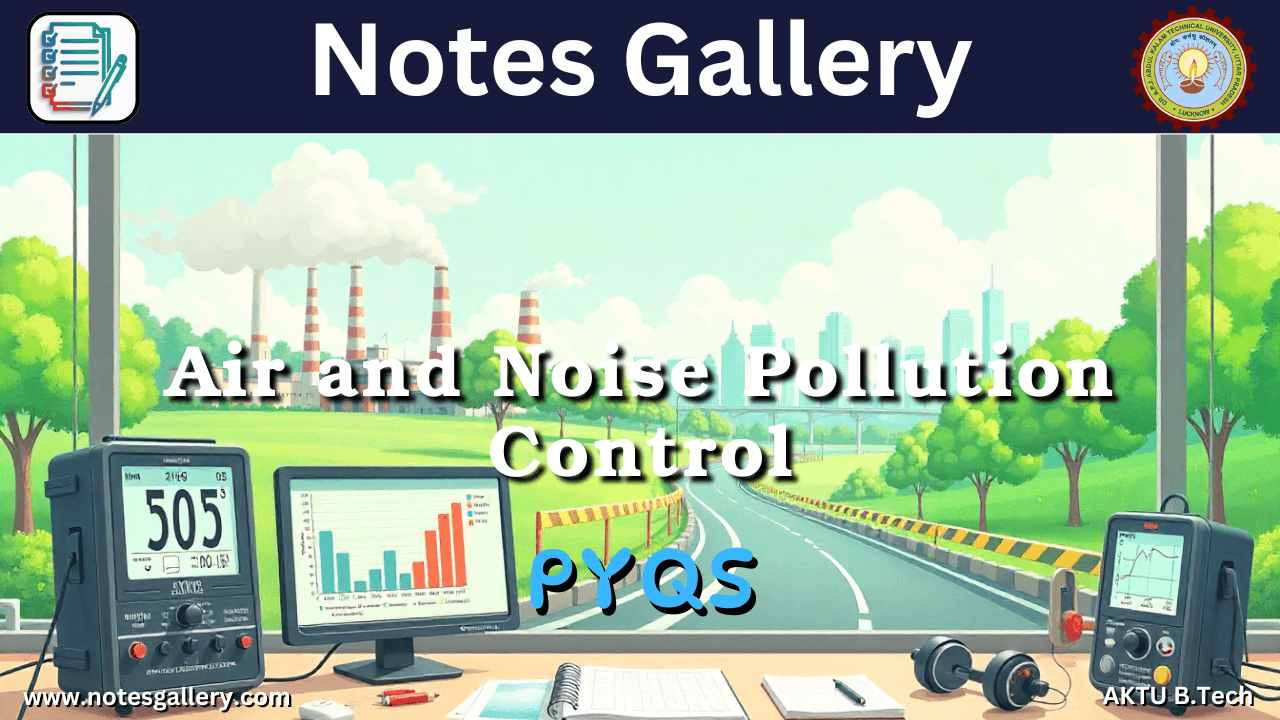Air and Noise Pollution Control is an important subject in the civil engineering curriculum because it deals with environmental quality, pollution management, and public health protection. For AKTU students, preparing through the Civil 3rd Year AKTU PYQS (Air and Noise Pollution Control) plays a critical role in understanding the patterns of questions, weightage of topics, and the overall exam structure. Since this subject contains theory-based concepts, laws, standards, and practical applications, PYQs help students know exactly how to frame answers and what topics need deeper revision.
Click Links given below for notes/Imp. Question/PYQs
https://notesgallery.com/aktu-b-tech-1st-year-free-study-materials/ First Year
https://notesgallery.com/aktu-b-tech-2nd-year-free-study-materials/ Second Year
https://notesgallery.com/aktu-b-tech-3rd-year-free-study-materials/ Third Year
https://notesgallery.com/aktu-b-tech-4th-year-free-study-materials/ Fourth Year
Importance of Air and Noise Pollution Control in Civil Engineering
Civil engineers play a major role in environmental protection and planning. This subject teaches how human activities affect air quality and how harmful noise levels disturb residential and industrial regions. The Civil 3rd Year AKTU PYQS (Air and Noise Pollution Control) emphasize various environmental acts, pollution monitoring methods, and control technologies. Understanding these PYQs helps students see how theoretical knowledge connects to real-world situations such as traffic management, industrial planning, solid waste handling, and pollution regulation.
What You Learn from AKTU PYQs in This Subject
When students solve the Civil 3rd Year AKTU PYQS (Air and Noise Pollution Control), they see that AKTU frequently asks questions from topics like sources of air pollution, particulate matter, gaseous pollutants, stack sampling, cyclone separators, ESPs, catalytic converters, and air quality standards. Many PYQs also focus on noise measurement, decibel scale, frequency weighting networks, and effects of noise on humans. Laws such as the Air (Prevention and Control of Pollution) Act 1981 and Environmental Protection Act 1986 also appear multiple times. These PYQs reveal the examiner’s focus and help students prioritize topics accordingly.
Frequently Asked Topics in Air Pollution Control
PYQs show that the most repeated topics include classification of pollutants, effects of air pollution on materials and human health, air quality index, stack height calculation basics, and working principles of pollution control devices. The Civil 3rd Year AKTU PYQS (Air and Noise Pollution Control) show that devices like fabric filters, wet scrubbers, cyclone separators, and electrostatic precipitators are extremely important. Students are expected to explain diagrams, write advantages, and discuss applications of each device. Numerical questions are rare but conceptual questions related to control techniques appear frequently.
Frequently Asked Topics in Noise Pollution Control
Noise pollution questions commonly include noise level measurement, dB scale, sound pressure concepts, types of noise, effects on human health, and noise mapping. The Civil 3rd Year AKTU PYQS (Air and Noise Pollution Control) highlight that AKTU often repeats questions on noise propagation, sound insulation techniques, and noise control at the source. Students should revise topics like noise barriers, vegetation belts, acoustic materials, and layout design for industries. PYQs help in understanding how to structure definitions, explain causes, and write short notes effectively.
How PYQs Improve Your Exam Preparation
PYQs guide you in writing answers the way AKTU expects. Many students lose marks because they write lengthy but irrelevant answers. The Civil 3rd Year AKTU PYQS (Air and Noise Pollution Control) show exactly how much explanation is needed for each type of question. For example, long questions usually expect diagrams, detailed explanations, and real-life examples, while short questions focus on definitions, acts, or short technical notes. PYQs also help you identify the weightage of each chapter, making revision easier and more organized.
Best Strategy to Score High in This Subject
A smart way to score well is to prepare notes for each chapter and then solve PYQs to strengthen understanding. After studying concepts like air pollutant classification or noise control measures, refer to the Civil 3rd Year AKTU PYQS (Air and Noise Pollution Control) to practice how these topics appear in exams. Make separate lists of repeated questions and important subtopics. Practising PYQs also improves memory retention, especially for environmental acts, standards, and pollution limits. After completing PYQs, revise diagrams and flowcharts because these visual elements boost your presentation quality.
Why PYQs Are Crucial for AKTU Exams
AKTU often repeats 40–60% of questions directly or indirectly. The Civil 3rd Year AKTU PYQS (Air and Noise Pollution Control) help you understand the exact framing of questions and the level of detail required. Once students become familiar with these patterns, they are more confident during exams. This subject becomes highly scoring when prepared through PYQs because the questions are mostly direct and based on core principles. Students who solve PYQs regularly face fewer surprises in the final exam.
Final Thoughts
The Civil 3rd Year AKTU PYQS (Air and Noise Pollution Control) are a reliable and essential resource for students aiming to score well in this subject. They guide you toward the most important topics, show repeated questions, and help you structure high-quality answers. With consistent revision, proper notes, and PYQ practice, students can easily master this environmental subject and perform strongly in their AKTU exams.
